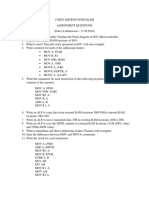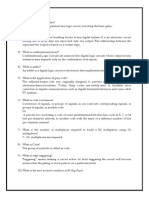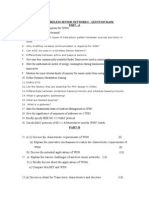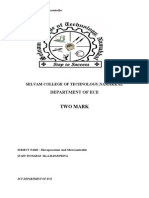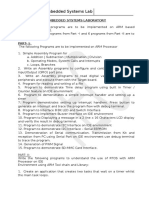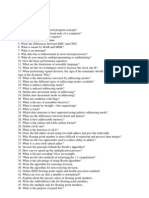0 ratings0% found this document useful (0 votes)
379 views8085 Microprocessor 2 Mark Questions
This document contains 50 questions about the 8085 microprocessor. It defines key terms related to microprocessors like bus, machine language, assembly language, high-level language, nibble, word, byte, and peripherals. It asks about the differences between a microprocessor and CPU. It also asks about components like registers, accumulator, flags, program counter, and types of operations. Additional questions cover the address bus, data bus, control bus, memory addressing, and signals involved in microprocessor functioning.
Uploaded by
JineshCopyright
© © All Rights Reserved
Available Formats
Download as DOCX, PDF, TXT or read online on Scribd
0 ratings0% found this document useful (0 votes)
379 views8085 Microprocessor 2 Mark Questions
This document contains 50 questions about the 8085 microprocessor. It defines key terms related to microprocessors like bus, machine language, assembly language, high-level language, nibble, word, byte, and peripherals. It asks about the differences between a microprocessor and CPU. It also asks about components like registers, accumulator, flags, program counter, and types of operations. Additional questions cover the address bus, data bus, control bus, memory addressing, and signals involved in microprocessor functioning.
Uploaded by
JineshCopyright
© © All Rights Reserved
Available Formats
Download as DOCX, PDF, TXT or read online on Scribd
You are on page 1/ 1
8085 Microprocessor 2 mark Questions
1. Define bus. What are its functions
2. What is machine language
3. What is assembly language
4. What is high level language
5. Define the term nibble
6. Define the term word
7. Define the term byte
8. Define the term peripherals
9. Define ROM
10. What are the differences between microprocessor and CPU
11. What is an assembler?
12. What is monitor program
13. Differences between compiler and interpreter
14. Define registers
15. Define accumulator
16. What are flags?
17. What is program counter
18. What are the different types of flags used in 8085
19. Explain the function of zero flag
20. Explain the function of carry flag
21. Explain the function of auxiliary carry flag
22. Explain the function of parity flag
23. Explain the function of sign flag
24. What are data transfer operations
25. What are logical operations
26. What are branching operations
27. What is address bus ?Why it is unidirectional
28. What is data bus? Why it is bidirectional
29. What is control bus
30. Name any two internally initiated operations
31. Name any two externally initiated operations
32. How many memory locations can be addressed by a microprocessor with 14 address lines?
33. Why program counter is 16 bit register
34. Why is stack pointer is 16 bit register
35. What is multiplexed address bus?
36. What is the use ALE signal
37. What are HOLD and HLDA signals
38. What is READY signal
39. What is TRAP signal
40. Explain the function of SID
41. Explain the function of SOD
42. What is instruction register
43. What is instruction decoder
44. Explain general purpose registers in 8085
45. What is the need for timing diagram
46. What is opcode fetch
47. Define instruction cycle
48. Define machine cycle
49. Define T-state
50. What is the role of crystal oscillator in 8085
You might also like
- Computer Communication Networks AssignmentNo ratings yetComputer Communication Networks Assignment3 pages
- Elective III-410252C-Embedded and Real Time Operating Systems Question Bank100% (1)Elective III-410252C-Embedded and Real Time Operating Systems Question Bank2 pages
- EC8681 MICROPROCESSORS AND MICROCONTROLLERS LAB Syll100% (1)EC8681 MICROPROCESSORS AND MICROCONTROLLERS LAB Syll2 pages
- Embedded Systems Assignment - 2 Questions Popular and The BestNo ratings yetEmbedded Systems Assignment - 2 Questions Popular and The Best4 pages
- EC 2301 Digital Communication Unit I and II Question BankNo ratings yetEC 2301 Digital Communication Unit I and II Question Bank63 pages
- Unit I Embedded Computing: 2 Marks QuestionsNo ratings yetUnit I Embedded Computing: 2 Marks Questions28 pages
- 28-5-I O Fundamentals Handshaking, Buffering-20!10!2021 (20-Oct-2021) Material I 20-10-2021 Unit-5-Lecture1100% (1)28-5-I O Fundamentals Handshaking, Buffering-20!10!2021 (20-Oct-2021) Material I 20-10-2021 Unit-5-Lecture115 pages
- Microprocessors and Microcontrollers Anna University Important Questions 2 Marks and 16 Marks Questions - Repeated Questions in Anna University Question Papers From All 5 Units ...No ratings yetMicroprocessors and Microcontrollers Anna University Important Questions 2 Marks and 16 Marks Questions - Repeated Questions in Anna University Question Papers From All 5 Units ...4 pages
- Advanced Microprocessor & Microcontroller Lab Manual PDFNo ratings yetAdvanced Microprocessor & Microcontroller Lab Manual PDF22 pages
- Microprocessor Previous Year Question Papers100% (1)Microprocessor Previous Year Question Papers6 pages
- EC482 Biomedical Engineering (Ktustudents - In)No ratings yetEC482 Biomedical Engineering (Ktustudents - In)3 pages
- 8085 Microprocessor Important Interview Questions100% (1)8085 Microprocessor Important Interview Questions4 pages
- Features of Intel 8279 Programmable Keyboard Display InterfaceNo ratings yetFeatures of Intel 8279 Programmable Keyboard Display Interface26 pages
- LPC2148 Microcontroller Architecture andNo ratings yetLPC2148 Microcontroller Architecture and50 pages
- CSL331 System Software and Microprocessor LabNo ratings yetCSL331 System Software and Microprocessor Lab144 pages
- CS 3351 Digital Principles and Computer OrganizationNo ratings yetCS 3351 Digital Principles and Computer Organization31 pages
- 8255 (Programmable Peripheral Interface)No ratings yet8255 (Programmable Peripheral Interface)6 pages
- Basic Concepts of Memory Interfacing - ComputerSCNo ratings yetBasic Concepts of Memory Interfacing - ComputerSC7 pages
- Department of Aeronautical Engineering Ae 2406 - Avionics Lab Lab Viva QuestionsNo ratings yetDepartment of Aeronautical Engineering Ae 2406 - Avionics Lab Lab Viva Questions1 page
- Questions - Introduction To MicroprocessorNo ratings yetQuestions - Introduction To Microprocessor8 pages
- Multicore DSP: From Algorithms to Real-time Implementation on the TMS320C66x SoCFrom EverandMulticore DSP: From Algorithms to Real-time Implementation on the TMS320C66x SoCNo ratings yet



